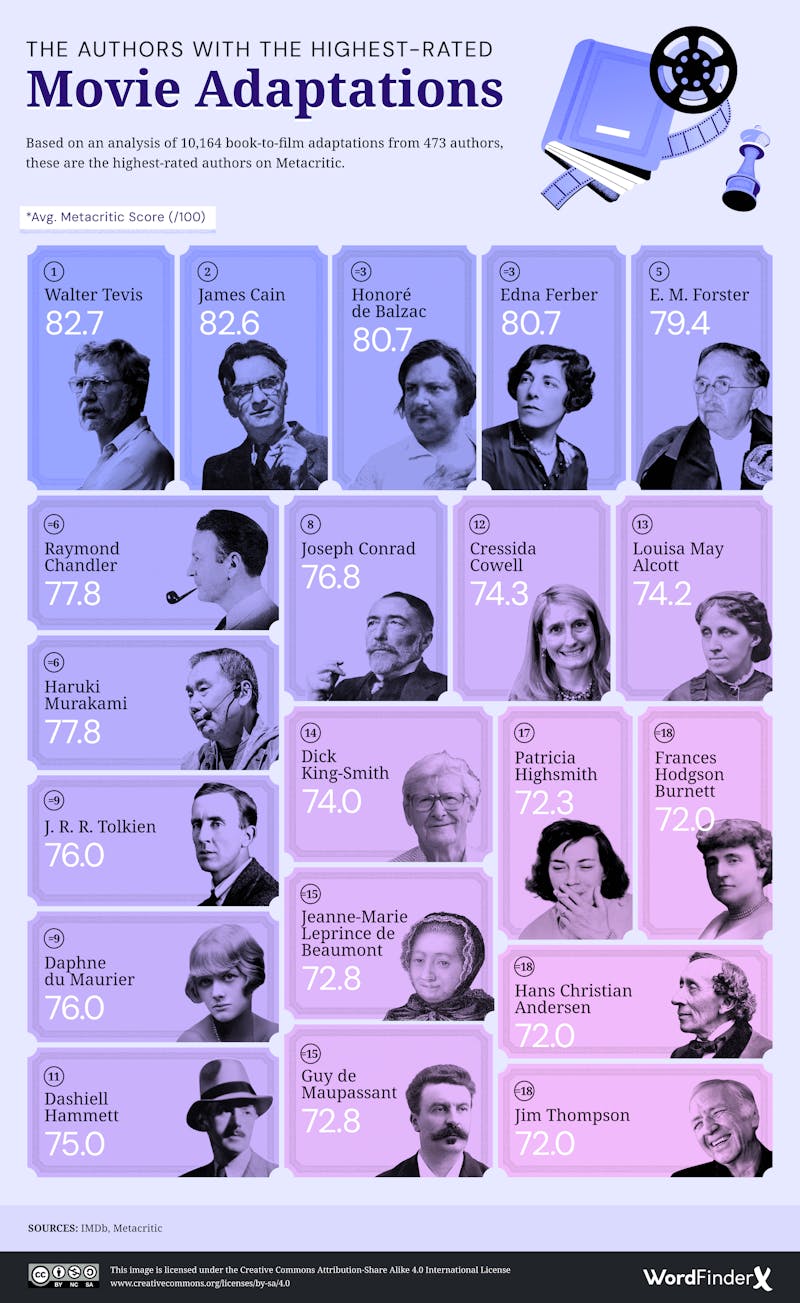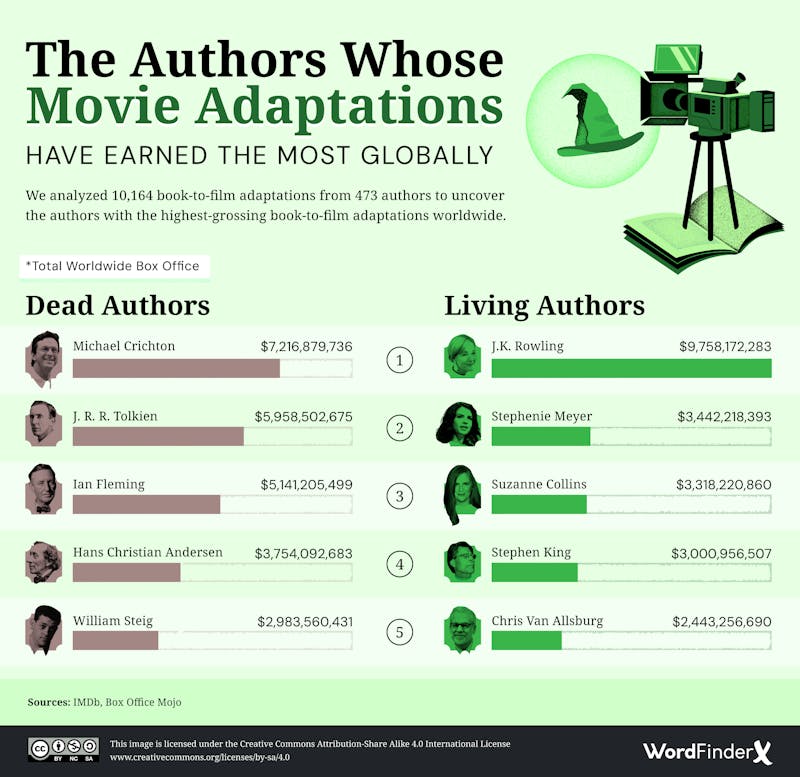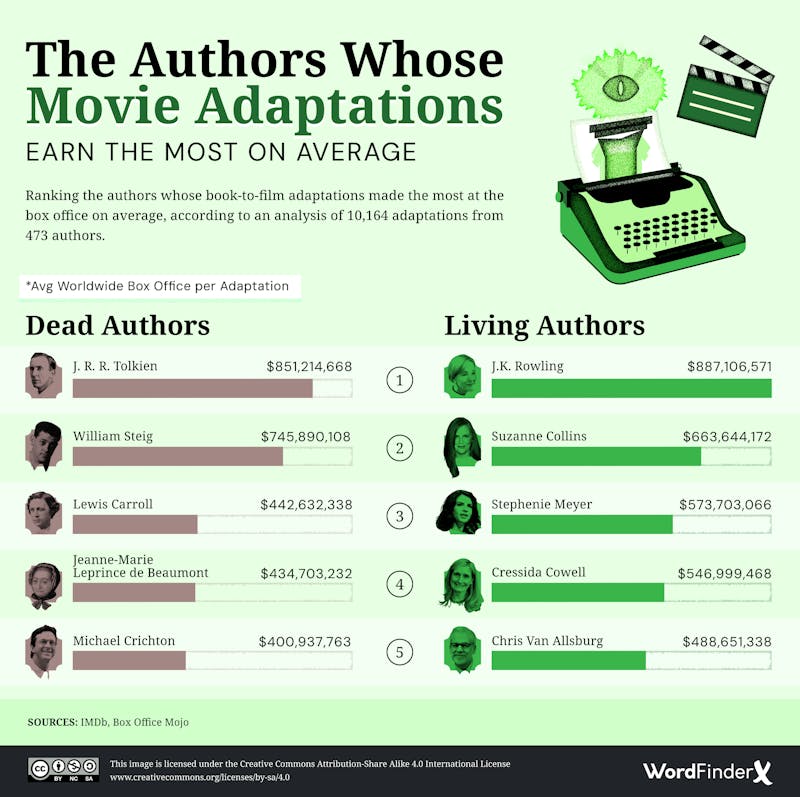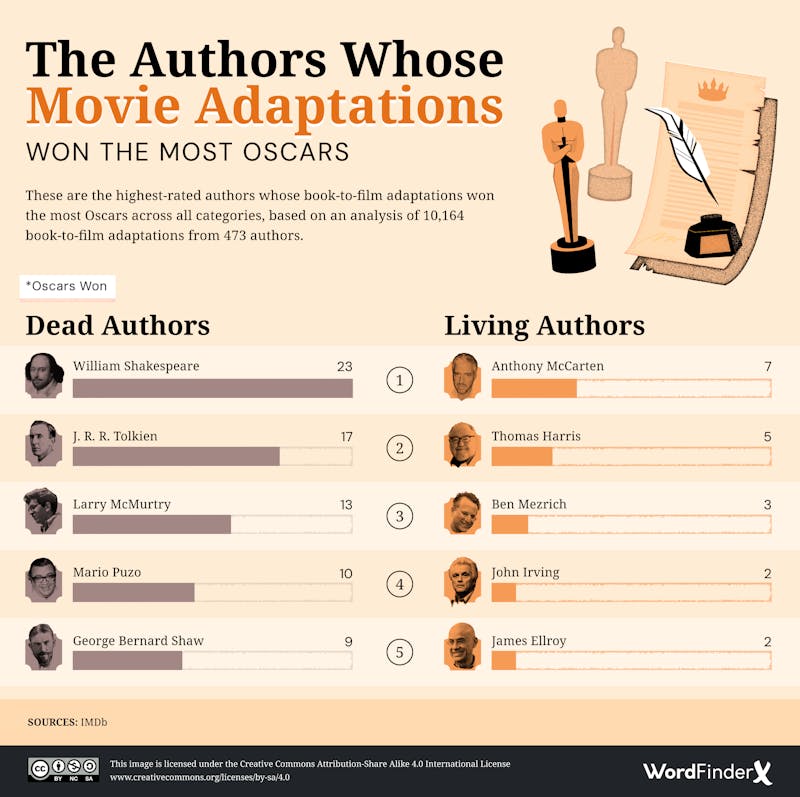The Most Successful Authors in Movie History

When done right, a movie adaptation of a book can be a winning situation for everyone.
The author gets a payday for the option and a boost in sales for their original and subsequent books. The film producers have a headstart in building an audience. And the book’s original fans get to see their favorite characters come to life on the silver screen — although these fans may be the most hurt if it’s not done right. Meanwhile, literature students get to cram a book’s worth of answers in just a couple of popcorn-chomping hours.
Crossword enthusiasts benefit, too — authors and their characters are a major source of crossword clues. So what if you find out about them by “doing a Constanza” and watching the adaptation instead of flipping the pages? You’ll learn answers about the book, the characters, and the cast and crew of the movie, too!
With Scottish author Alasdair Gray's Poor Things sweeping up Oscars and two spicy new adaptations of The Beast in the Jungle making it four adaptations of Henry James’s novella in a decade, we decided to take a closer look at the book-to-movie industry. We analyzed the critical and box office performance of 473 authors and 10,164 adaptations to find which movie adaptations have been done right — making their writers the most successful authors in movie history.
What We Did
Data analysts at Word Finder X used IMDb to build a list of authors with three or more book-to-film adaptations and calculated each author's average Metacritic score, average worldwide box office gross, total worldwide box office gross and Oscars won across all categories.
Key Findings
- Walter Tevis is the author with the most critically acclaimed movie adaptations, rating an average of 82.7 on Metacritic.
- J. R. R. Tolkien is the best box office bet of any author who’s died, with adaptations of his movies averaging $851,214,668 at the box office.
- J. K. Rowling is the most lucrative author of all, with adaptations of her books grossing $9,758,172,283 ($9.76 billion).
- William Shakespeare is the writer whose adaptations have won the most Oscars (23).
The Authors with the Highest Rated Movie Adaptations
First, we identified the most critically acclaimed original authors of movie adaptations. To do this, we found the average Metacritic score across each author’s adapted oeuvre. The top 20 is dominated by authors who are no longer with us; Drive My Car author Haruki Murakami (77.8) and How to Train Your Dragon’s Cressida Cowell (74.3) are the only living authors on this list.
Murakami has five adaptations to his name on Metacritic, although a number of lower-profile adaptations also exist. His average rating was given a significant boost by Ryûsuke Hamaguchi’s 2021 adaptation of his short story Drive My Car, which won Best Screenplay, the FIPRESCI Prize, and the Prize of the Ecumenical Jury at Cannes before taking the Academy Award for Best International Feature at the Oscars.
Walter Tevis (82.7) and James M. Cain (82.6) duke it out for the number one spot. Cain’s authorial touch is associated with dozens of midcentury movies, many in the film noir genre. He made a considerable buck from them, particularly considering he found movies to be “crudely schematic, childishly contrived, simple-minded, superficial and unsophisticated,” according to William Preston Robertson.
Tevis’s cinematic reputation rests on just three movies: The Hustler, The Color of Money and The Man Who Fell to Earth, although the recent TV adaptation of The Queen’s Gambit was also well received. “The Hustler is one of those films where scenes have such psychic weight that they grow in our memories,” wrote Roger Ebert.
Which Authors’ Movie Adaptations Have Earned the Most Globally?
To earn a huge box office total from your literary works, it helps to have a franchise that studios and audiences can’t get enough of. Fame-wise, many of these author names are on a par with their creations: James Bond, Katniss, Bella and Edward, and Frodo. And J. K. Rowling is nearing the $10 billion mark as the highest-grossing author of adapted movies, thanks to her Harry Potter movies and Fantastic Beasts spinoffs.
On the other hand, Stephen King and Hans Christian Andersen are trusted brand names in their respective genres. Their stories can reliably be made to fit the cinematic format, no matter how long-winded the source material.
And the top-grossing author who is no longer with us manages a bit of both. Michael Crichton’s bibliography was adapted piecemeal over the years, with his intelligent but accessible takes on contemporary technology and society proving attractive to producers and audiences alike. He also wrote and directed the original Westworld and directed an adaptation of Robin Cook’s Coma. However, he is, of course, best known for the adaptations of his novel Jurassic Park and their sequels.
Which Authors’ Movie Adaptations Earn the Most on Average?
A known piece of intellectual property can be a reliable money spinner, whether it’s an ever-iterating franchise or a one-off piece that gets remade again and again. The works of Lewis Carroll and Jeanne-Marie Leprince de Beaumont fall into the latter category.
Lewis Carroll’s box office success is credited mostly to his 1865 novel Alice's Adventures in Wonderland and its sequel, Through the Looking-Glass — a poem from which Jabberwocky has also been adapted in its own right. IMDb lists over 70 Alice adaptations, although not all were for the cinema. De Beaumont, who died in 1780, wrote the definitive version of the Beauty and the Beast fairytale that has been remade dozens of times.
One author who enjoyed the franchise effect without needing to keep typing out sequels was William Steig. In fact, Steig was already 83 years old when he published the picturebook Shrek!, which made him today’s second-highest-grossing dead author.
Along with its sequels and spinoffs, the Shrek adaptation has contributed to $746 million in takings at the box office. By the time the first movie came out, Steig was in his 90s, notes curator Claudia Nahson — but “he went to see the movie and was asked his opinion. He said something like, ‘It’s vulgar, it’s disgusting — and I love it!’”
The Authors Whose Movie Adaptations Won the Most Oscars
William Shakespeare’s plays have found very different forms on the silver screen, as the difference between West Side Story and Baz Luhrmann’s William Shakespeare’s Romeo + Juliet, both adapted from the same play, attest. The pressure of doing something original with Shakespeare’s material under the gaze of showbusiness’s most discerning thespians seems to bring out the best in a filmmaker, with Shakespeare's adaptations securing an unrivaled 23 Oscars (against those of Tolkien in second place with just 17).
However, there was a gap of over half a century between Shakespeare flicks winning in any top category, from Franco Zeffirelli’s Romeo and Juliet (1968) to Spielberg’s West Side Story remake (2021). Celebrated Japanese director Akira Kurosawa got his only ever Oscar nomination for his 1985 King Lear adaptation, Ran. In the end, the film won only Best Costume Design for Emi Wada.
The Movie of the Book
It could be the tagline for a Charlie Kaufman horror movie: “Hollywood Is in the Throes of an IP Frenzy,” screams The Hollywood Reporter. But this is the real-life film scene, where our best journalists write articles mainly in the hope of getting it optioned, “the industry has reduced actors to stewards of profitable intellectual property,” and 92 of the top 100 grossing movies between 2013-2023 were based on existing property. Occasionally, it would be nice to see a movie imagined first as a uniquely cinematic experience.
On the other hand, many of these films breathe new life and ideas into fading stories, and in the case of Kaufman’s Adaptation (of Susan Orlean’s nonfiction The Orchid Thief), rewrite the rules of transferring a book to the big screen altogether. As our Oscar and ratings analyses above show, a book can inspire filmmakers to do some of their best work. And just imagine how enthralling a movie adapted from a particularly devilish crossword could be!
Methodology
To identify the most successful authors in movie history, we first built a seed list of authors with three or more book-to-film adaptations (novels, short stories or plays) by analyzing all author profile pages on IMDb. This resulted in a list of 473 authors and 10,164 adaptations.
Next, we calculated each individual author's average Metacritic score, average worldwide box office gross, total worldwide box office gross and Oscars won across all categories.
This data analysis was completed in April 2024.



